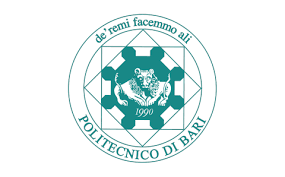
| Partner full name | Polytechnic University of Bari |
| Partner short name | POLIBA |
| Country | Italy |
| Website | www.poliba.it |
Politecnico di Bari (www.poliba.it), English name Polytechnic University of Bari, is an Italian state university founded in 1990 and it is one of the leading institutions for studying engineering and architecture in Italy. Politecnico’s team is dedicated to fulfilling the University’s educational and research mission, to advancing a vision for the University’s future, and to strengthen its tradition of academic excellence. Nowadays Politecnico’s permanent staff is composed of around 295 researchers/professors, and 276 members of administrative staff. All of them support and work for around 10.000 undergraduate and postgraduate students. They can rely on a very wide campus with modern buildings, lecture rooms, research laboratories, studying rooms, leisure facilities, and an Internet point. Since 2012, POLIBA consists of five Departments, while it has a budget of revenues of around 70 M Euro of which 10% from research competitive funds. POLIBA participates in MEDSAL with the Department of Civil, Environmental, Land, Building Engineering and Chemistry (DICATECh). DICATECh includes 18 disciplinary sectors related to the field of Civil and Environmental Engineering and Chemistry. DICATECh has a staff of 70 researchers and teachers, and 36 technical staff. The Dept. has 7 main laboratories (Applied Geomatics – AGlab, Coastal Engineering – LIC, Environmental Technologies – ETL, Geotechnical Engineering, Building Technologies, Cognition, and Spatial Planning, Transportation Planning and Mobility). Chemical laboratories offer many facilities (NMR, GC-MS, and GC-FID, mass spectrometer at high resolution – HRMS, AAS). Based on its expertise, POLIBA will mainly contribute to the identification and characterization od salinization in coastal aquifers, and specifically for Salento aquifer for which possesses long-time databases. In addition, POLIBA will contribute to the harmonization of legislation and coastal aquifer management between the involved countries of PPs, we will be responsible for the multi-sensors of the test sites, including their operational use and monitoring capabilites. Overall, POLIBA will be responsible for the Salento test site and the Lead Partner in WP5 (Demonstration Activities in MEDSAL test sites) and in 5 Tasks.
Principal Investigator and key-members of POLIBA team
Prof. Maria Dolores Fidelibus (F) is an Associate Professor of Engineering Geology and Hydrogeology. Among her recent qualifications: 2012-2017, Member of the Italian Chapter of IAH; 2012-2017, Ass. Editor for Hydrological Sciences Journal; 2017, Honorary Plate for the Contribution to the Hydrogeology and to the work of the IAH Hellenic Chapter; 2017-2018, Guest Editor of Special Issue of Geosciences, “Inland and Coastal Karst Aquifers: Functioning, Monitoring and Management”; 2017-2020, Member of IGP Scientific Board of UNESCO; 2019-2021, Ass. Editor of Geosciences. From 1990 she participated in many cooperation projects of EC dealing with karst hydrogeology and coastal aquifers. She has been a Member of the Scientific Committee and Chairperson for numerous International and National Congresses dealing with hydrogeological topics. She has authored and co-authored more than 80 publications in refereed journals, book chapters, and national/international conferences. Her main research interests are conceptual modeling of aquifers, seawater intrusion in coastal aquifers, geochemistry and isotope hydrology, karst geomorphology.
Alessandro Reina (M) is a researcher expert in geology and hydrogeology of the carbonate formations, sedimentology, cave exploration and field surveys.
Gabriella Balacco (F) is a high professional technician, an expert in water management, irrigation, hydrology and climate change, acquisition and data analysis, GIS.
Giovanni Bruno (M) is a highly professional technician, an expert in the hydrogeology of karst and hard rocks, karst geomorphology, rock mechanics and geoarchaeology.

